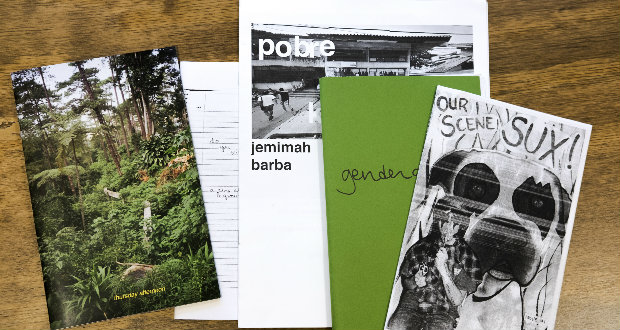In a small room at Common Space in Downtown Fresno, about a dozen people recently gathered to read. Except, it wasn’t the typical book or magazine in their hands. It was a zine.
Zines are often defined as self-published, homemade or online pieces of publication that resemble a magazine. Unlike a regular magazine, a zine is not reviewed by an editor or overarching organization.
Its contents can range from writing, drawing, pasted magazine clips or photographs — all done by the author and creator. Zines normally draw inspiration from what the person can create.
Armed with scissors, glue, paper and their vision to inspire, most in the small group who gathered recently constructed their first zine during a workshop. They used the simplest zine format, a folded 8½ by 11 inch piece of paper, which results in a six-page mini zine.
The workshop was one of Laguna Zine Collective’s attempts to introduce zines to Fresno and to plant seeds that may lead to a thriving local zine community.

“It can be seen as very punk because there’s really no rules to it,” said Jemimah Barba, a co-founder of Laguna and a Fresno State anthropology major.
Barba said that zines can come in many different formats, and the way they are created can vary and depends on how an author wants to create it. She designed a zine inspired by anxiety, she said.
“It’s a zine basically handwritten and Xeroxed,” Barba said while holding up the tiny zine. “The very act of making zines, it’s a very DIY [do it yourself].”
With such freedom, any topic the author chooses can be written about without the fear of a publisher or editor censoring the narrative, according to the zine enthusiasts.
“Essentially, it really goes down to basis of voice,” Barba said. “For somebody to enable anyone to make zines, it’s kind of giving that power through them to give them the voice.”
Zines typically offer outside-the-box creativity. So it is fitting that they appeal to the often underrepresented issues and voices in society, like trans and queer issues and people whose muted voices often come alive through a zine.
In fact, the recent workshop was a collaboration with Trans-E-Motion and MyLGBTPlus, two local support groups. They brought the supplies ”’ paper, magazines and glue ”’ while Laguna provided the helping hand in creating a zine.
“We need more narratives that aren’t so whitewashed. We need more narratives that come from people who are underserved and marginalized,” Barba said. “There’s so many issues that we can explore in different ways if it’s written and distributed.”
And the low cost of creating a zine allows artists, photographers and writers to distribute their art for a fraction of the price compared with a traditional magazine. Zines are all about accessibility and exposure for both creators and readers, according to those who take part in them.
“It’s an easy way to get my prints out there in a more tangible format versus selling a very big print for very [a] expensive [price],” said Vicente Velasquez, co-founder of Laguna. “I can sell a very small photo zine for a really inexpensive price and still get my work out there.”

Barba and Velasquez, aside from displaying examples of their own zines, also brought examples of zines that they gathered from visiting and tabling at zine fairs in other cities, such as San Jose and Los Angeles.
They hope the attention and excitement for zines grows and will inspire people to create their own in Fresno.
“The whole thing about making zines [is] making it accessible to folks that may want to get into it soon,” Barba said. “We’re making that happen. In Fresno, it’s unfortunately not a scene of importance yet. I’m trying to push for it.”
Hannah Livingstone, who attended the workshop, showed off her zine. It was made with images cut and pasted from various magazines.
An exact theme was lacking, but it was her first time trying it out, she said. The meaning emerged through the images she found and resonated with. She described it as being about “resistance” and drew from the current social climate.
One spread said, “Now is the time for resistance,” with each of these words being different cuts from a magazine or written in marker.

“I always kind of wanted to get into making zines but never exactly [knew] how or when to start,” Livingstone said. “Having the resources around and the people showing you how to fold the paper, it’s really nice.”
By the end of the workshop, Barba and Velasquez said they felt better about their goals to bring a concentrated zine scene to Fresno.
“I’ve never really ever been to an event [like] this, where people bring whatever they had and put together zines right here and there,” said Velasquez. “It’s really fun and it’s really important for people to be around other creatives.”
And in the quest to grow the zine community, Barba said Laguna is there to offer any assistance. After all, she said, it’s for a good cause.
“As Laguna, we want to make copies of what you make,” Barba said. “We just want to enable folks who are interested in writing their own voices or their own narratives.”
Barba plans to create more events around Fresno like the one at Common Space, specifically in the Tower District. Other ventures include a pop-up library at Fresno State to introduce students to the art form.
“My agenda, personally, is to make people create more and push people in Fresno to read and write,” Barba said. “That is my passion, writing and literature. This is my agenda that I’m pushing through Laguna.”





